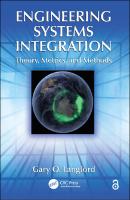Engineering Systems Integration
Proposal review
Theory, Metrics, and Methods
Author(s)
Langford, Gary O.
Contributor(s)
Lindholm, Kyra (editor)
Language
EnglishAbstract
Dreamers may envision our future, but it is the pragmatists who build it. Solve the right problem in the right way, mankind moves forward. Solve the right problem in the wrong way or the wrong problem in the right way, however clever or ingenious the solution, neither credits mankind. Instead, this misfire demonstrates a failure to appreciate a crucial step in pragmatic problem solving: systems integration. The first book to address the underlying premises of systems integration and how to exposit them in a practical and productive manner, Engineering Systems Integration: Theory, Metrics, and Methods looks at the fundamental nature of integration, exposes the subtle premises to achieve integration, and posits a substantial theoretical framework that is both simple and clear. Offering systems managers and systems engineers the framework from which to consider their decisions in light of systems integration metrics, the book isolates two basic questions, 1) Is there a way to express the interplay of human actions and the result of system interactions of a product with its environment?, and 2) Are there methods that combine to improve the integration of systems? The author applies the four axioms of General Systems Theory (holism, decomposition, isomorphism, and models) and explores the domains of history and interpretation to devise a theory of systems integration, develop practical guidance applying the three frameworks, and formulate the mathematical constructs needed for systems integration. The practicalities of integrating parts when we build or analyze systems mandate an analysis and evaluation of existing integrative frameworks of causality and knowledge. Integration is not just a word that describes a best practice, an art, or a single discipline. The act of integrating is an approach, operative in all disciplines, in all we see, in all we do.
Keywords
Management of IT; Engineering Management; Systems and Control Engineering; ENG; BUSINESS/MANAGEMENT; SCI-TECH; GENERALENGINEERING; INFORMATIONSCIENCE; STM; design; entities; hubble; objects; physical; process; recursive; space; telescope; thinkingDOI
10.1201/b12006Publisher
Taylor & FrancisPublisher website
https://taylorandfrancis.com/Publication date and place
2012Imprint
CRC PressClassification
Knowledge management
Engineering: general
Civil engineering, surveying and building
Mechanical engineering


 Download
Download